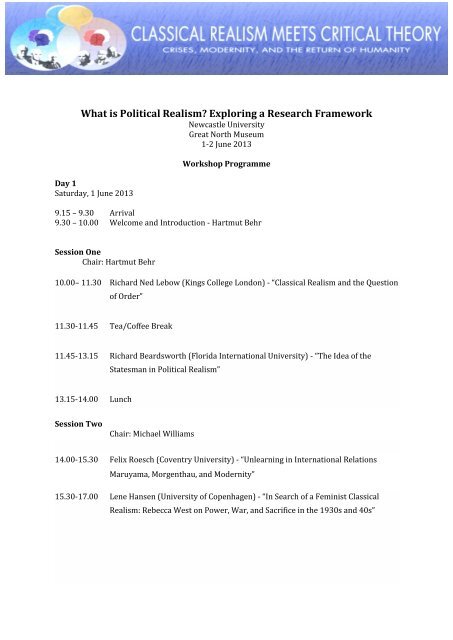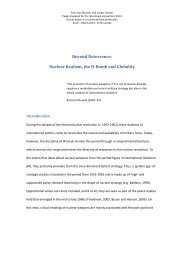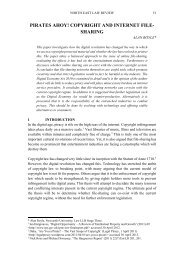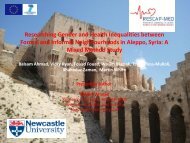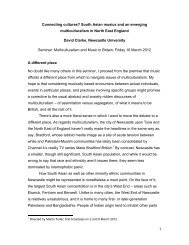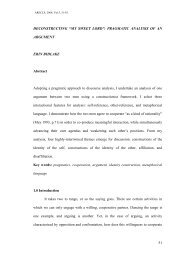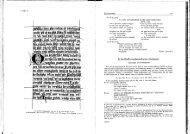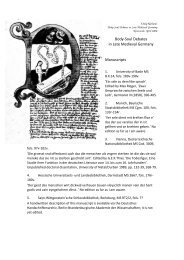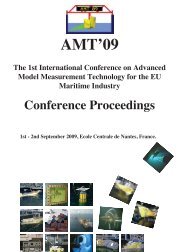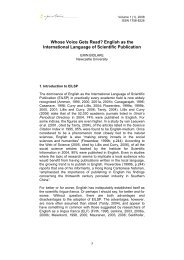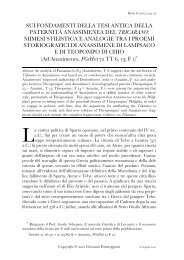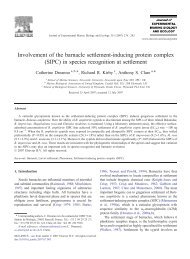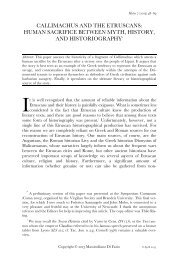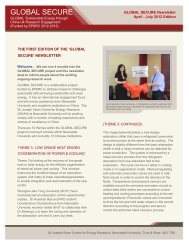What is Political Realism? Exploring a Research Framework
What is Political Realism? Exploring a Research Framework
What is Political Realism? Exploring a Research Framework
Create successful ePaper yourself
Turn your PDF publications into a flip-book with our unique Google optimized e-Paper software.
<strong>What</strong> <strong>is</strong> <strong>Political</strong> Real<strong>is</strong>m? <strong>Exploring</strong> a <strong>Research</strong> <strong>Framework</strong><br />
Newcastle University<br />
Great North Museum<br />
1-2 June 2013<br />
Day 1<br />
Saturday, 1 June 2013<br />
Workshop Programme<br />
9.15 – 9.30 Arrival<br />
9.30 – 10.00 Welcome and Introduction - Hartmut Behr<br />
Session One<br />
Chair: Hartmut Behr<br />
10.00– 11.30 Richard Ned Lebow (Kings College London) - “Classical Real<strong>is</strong>m and the Question<br />
of Order”<br />
11.30-11.45 Tea/Coffee Break<br />
11.45-13.15 Richard Beardsworth (Florida International University) - “The Idea of the<br />
Statesman in <strong>Political</strong> Real<strong>is</strong>m”<br />
13.15-14.00 Lunch<br />
Session Two<br />
Chair: Michael Williams<br />
14.00-15.30 Felix Roesch (Coventry University) - “Unlearning in International Relations<br />
Maruyama, Morgenthau, and Modernity”<br />
15.30-17.00 Lene Hansen (University of Copenhagen) - “In Search of a Femin<strong>is</strong>t Classical<br />
Real<strong>is</strong>m: Rebecca West on Power, War, and Sacrifice in the 1930s and 40s”
Day 2<br />
Sunday, 2 June 2013<br />
9.15 – 9.30 Arrival<br />
Session One<br />
Chair: Richard Ned Lebow<br />
9.30-11.00 Timothy W. Luke (Virginia Tech) - "<strong>What</strong> <strong>is</strong> <strong>Political</strong> Real<strong>is</strong>m? Understandings of<br />
Agency, Temporality and Spatiality in "Classical" Real<strong>is</strong>m"<br />
11.00-12.30 Kamila Stullerova (Aberystwyth University) - “Sceptic<strong>is</strong>m and Real<strong>is</strong>t<br />
Ep<strong>is</strong>temology”<br />
12.30-13.00 Lunch<br />
Session Two<br />
Chair: Richard Beardsworth<br />
13.00-14.30 Sean Molloy (University of Kent) - “The Machiavellian Ethics of Carr's ‘The<br />
Twenty Years' Cr<strong>is</strong><strong>is</strong>’ ”<br />
14.30-16.00 Vibeke Schou Tjalve (Dan<strong>is</strong>h Institute of International Studies) - “Under the Pale<br />
Light of the Human<strong>is</strong>t Moon”? Real<strong>is</strong>m, Secular<strong>is</strong>m and International Politics in the<br />
Global Age<br />
16.00-17.00 Michael C. Williams (University of Ottawa) - Concluding Remarks and Further<br />
Strateg<strong>is</strong>ing<br />
***<br />
Supporting Institutions:<br />
<strong>What</strong> <strong>is</strong> <strong>Political</strong> Real<strong>is</strong>m? <strong>Exploring</strong> a <strong>Research</strong> <strong>Framework</strong><br />
1-2 June 2013 Great North Museum Newcastle upon Tyne, UK
In the social sciences, the term “real<strong>is</strong>m” ra<strong>is</strong>es as many ideas and associations as it <strong>is</strong> elusive when<br />
enquiring into its h<strong>is</strong>tory. It has been used by many, with a plethora of variations such as classical,<br />
structural, offensive etc., <strong>is</strong> and has been associated with a series of authors, sometimes more by means of<br />
intellectual appropriation than by respective authors themselves, as well as it has been used as a label for<br />
authors who have never used the term themselves. In order to gain some clarity about the term and<br />
concept of “real<strong>is</strong>m”, the workshop intends to pursue the questions of what <strong>is</strong> political real<strong>is</strong>m and how it<br />
can be used as, or elaborated into, a research framework, particularly for engaging questions of/on cr<strong>is</strong>es<br />
and modernity. These d<strong>is</strong>cussions take place before the background of a recent revival of “real<strong>is</strong>m” and<br />
(re)appreciation of classical “real<strong>is</strong>t” thinkers in the d<strong>is</strong>ciplines of International Relations, <strong>Political</strong><br />
Science, and Philosophy.<br />
Abstracts<br />
"In Search of a Femin<strong>is</strong>t Classical Real<strong>is</strong>m: Rebecca West on Power, War, and Sacrifice in the 1930s<br />
and 40s"<br />
Lene Hansen, University of Copenhagen<br />
To the extent that IR scholars have heard about Rebecca West, it <strong>is</strong> most likely through the claim that her<br />
1941 travelogue "Black Lamb and Grey Falcon" made Western politicians and journal<strong>is</strong>ts adopt a pro-<br />
Serbian, anti-intervention<strong>is</strong>t stance on the Bosnian War. That claim however <strong>is</strong> problematic: Rebecca<br />
West romanticized Yugoslavia in general, not the Serbs, and she was staunchly anti-Commun<strong>is</strong>t making<br />
her an unlikely supporter of Milosevic and h<strong>is</strong> Bosnian allies in the 1990s. Perhaps more importantly in<br />
terms of IR, the analytical and political simplicity attributed to West might have cautioned IR scholars<br />
against a deeper engagement with her work. My turn to Rebecca West within the "Classical Real<strong>is</strong>m Meets<br />
Critical Theory" network <strong>is</strong> based on my suggestion that although "Black Lamb and Grey Falcon" <strong>is</strong> not a<br />
conventional academic text, it shares a series of thematic concerns with key works of the 1930s, most<br />
prominently Carr's "The Twenty Years' Cr<strong>is</strong><strong>is</strong>". A consideration of "Black Lamb and Grey Falcon" <strong>is</strong><br />
particularly apt for a d<strong>is</strong>cussion of the relationship between political real<strong>is</strong>m and gender in IR. Th<strong>is</strong><br />
relationship has so far been devoted little attention from either femin<strong>is</strong>ts or scholars working on the<br />
real<strong>is</strong>t tradition. Th<strong>is</strong> absence <strong>is</strong> linked to theoretical assumptions within femin<strong>is</strong>t IR as well as real<strong>is</strong>t<br />
work, and my goal <strong>is</strong> to d<strong>is</strong>cuss these assumptions as well as the possibility of a gendered political real<strong>is</strong>m<br />
through an analys<strong>is</strong> of West's v<strong>is</strong>ion of international politics, a v<strong>is</strong>ion that explicitly connected gender to<br />
concepts such as power, war, sacrifice and hero<strong>is</strong>m.<br />
***<br />
<strong>What</strong> <strong>is</strong> <strong>Political</strong> Real<strong>is</strong>m? <strong>Exploring</strong> a <strong>Research</strong> <strong>Framework</strong><br />
1-2 June 2013 Great North Museum Newcastle upon Tyne, UK
“Under the Pale Light of the Human<strong>is</strong>t Moon”? Real<strong>is</strong>m, Secular<strong>is</strong>m and International Politics in<br />
the Global Age<br />
Vibeke Schou Tjalve, Dan<strong>is</strong>h Institute of International Studies<br />
Does such a thing as a common ‘framework for analys<strong>is</strong>’ flow from the works of Classical Real<strong>is</strong>m? If so,<br />
what does its purpose and politics like? And, most importantly: should we – can we – adopt it for the<br />
conduct and critique of international politics today? In the growing literary on how and if to revive the<br />
Classical Real<strong>is</strong>t agenda, a response to those questions seem increasingly to fall in two categories. Both<br />
ins<strong>is</strong>t on Classical Real<strong>is</strong>m as a profoundly normative and d<strong>is</strong>tinctly modern political project, intent on<br />
restraining the violent forces of political ideology in a world ‘from which the Gods have departed’. And<br />
both agree on that project as one shaped by defining theor<strong>is</strong>ts of secular<strong>is</strong>m in the periods transatlantic<br />
intellectual exchange: Nietzsche, Weber and Schmitt; Dewey, Adorno and Lippmann. It <strong>is</strong> on the<br />
instruments of restraint adopted, and hence on the political commitments ultimately made, that the<br />
emerging literature part ways. One part takes real<strong>is</strong>m to the right, approaching it as a deliberate attempt<br />
to insulate international politics from the emotive irrational<strong>is</strong>m of modern mass politics, by ‘saving’ the<br />
practice of statecraft for the cooler heads of the w<strong>is</strong>e and the few. Another takes real<strong>is</strong>m to the left,<br />
attaching it to the ethics of critical theory and to its commitment to deconstructive, deliberative or<br />
agon<strong>is</strong>tic democracy. Th<strong>is</strong> paper draws on the rich and rewarding points of both these sets of literature,<br />
yet argues that the real<strong>is</strong>t stance on secular<strong>is</strong>m and religion must be rethought and readdressed. Only<br />
thus may we a) acknowledge the d<strong>is</strong>tinctiveness of Classical Real<strong>is</strong>m and avoid simply subsuming it under<br />
contemporary theoretical banners, b) recognize why that d<strong>is</strong>tinctiveness makes the appropriation of<br />
Classical Real<strong>is</strong>m in the twenty first century context a difficult and ambiguous one c) appreciate why<br />
features of global politics today may require of us, that even so, we try.<br />
***<br />
Unlearning in International Relations. Maruyama, Morgenthau, and Modernity<br />
Felix Rösch, Coventry University<br />
Real<strong>is</strong>m developed globally as a worldview in the mid-twentieth century, as similar concerns about<br />
modernity spanned different intellectual styles and academic cultures. Encapsulated in th<strong>is</strong> real<strong>is</strong>t<br />
worldview <strong>is</strong> a world postulate that promotes a global public sphere in the form of a world community.<br />
Currently, th<strong>is</strong> world postulate <strong>is</strong> reconsidered, as some scholars attempt to reconcile real<strong>is</strong>m with<br />
cosmopolitan<strong>is</strong>m in order to demonstrate the intellectual strength of real<strong>is</strong>m. Th<strong>is</strong> paper <strong>is</strong> contributing<br />
to th<strong>is</strong> current d<strong>is</strong>course by elaborating on the ep<strong>is</strong>temological and methodological underpinnings of th<strong>is</strong><br />
real<strong>is</strong>t worldview, as it <strong>is</strong> argued – by drawing on a concept from Joshua Reynolds – that real<strong>is</strong>ts pursued<br />
unlearning in International Relations. In d<strong>is</strong>cussing the works of Maruyama Masao and Hans Morgenthau,<br />
it <strong>is</strong> demonstrated that unlearning <strong>is</strong> real<strong>is</strong>m’s ambition to criticize and move beyond the ep<strong>is</strong>teme of<br />
modernity because real<strong>is</strong>ts refer to ancient, pre-modern thought in order to re-establ<strong>is</strong>h the human being<br />
as a willful actor in the world political order and as a creator of life-worlds.<br />
<strong>What</strong> <strong>is</strong> <strong>Political</strong> Real<strong>is</strong>m? <strong>Exploring</strong> a <strong>Research</strong> <strong>Framework</strong><br />
1-2 June 2013 Great North Museum Newcastle upon Tyne, UK
***<br />
Sceptic<strong>is</strong>m and Real<strong>is</strong>t Ep<strong>is</strong>temology<br />
Kamila Stullerova, Aberystwyth University<br />
The underlying aspiration for th<strong>is</strong> paper <strong>is</strong> to think about real<strong>is</strong>m – the real<strong>is</strong>m that has been recovered<br />
by re-v<strong>is</strong>iting the work of Morgenthau, Niebuhr and other mid-century thinkers – as a fruitful theoretical<br />
position that goes beyond interpreting canonical texts. The paper’s overarching argument <strong>is</strong> that real<strong>is</strong>m<br />
can provide for such a position, but that our conventional understanding of what IR theory <strong>is</strong> must be<br />
shifted. Th<strong>is</strong> effort benefits from examining real<strong>is</strong>m through the lens of the tradition of political theory, in<br />
particular the sceptical political thought. Because political theory does not ordinarily operate in the<br />
categories of ontology/ep<strong>is</strong>temology, it allows us to appreciate the complexity of the process through<br />
which real<strong>is</strong>t theor<strong>is</strong>ing tames its sceptic<strong>is</strong>m by creating space for politics and the knowledge produced<br />
by political practice to mitigate for the limitations of philosophical knowledge. Transposing th<strong>is</strong> back to IR<br />
theory categories of ontology/ep<strong>is</strong>temology, it becomes obvious that real<strong>is</strong>m <strong>is</strong> an ep<strong>is</strong>temologicallycentred<br />
theory that unceasingly rev<strong>is</strong>es its ontology and normative commitments, which it actually<br />
cannot set apart. As a result, real<strong>is</strong>m cannot separate explanation from ethics, both of which it constantly<br />
qualifies. Its only ‘given’ <strong>is</strong> that the process of knowledge-formation, which necessitates input from each<br />
and every subject of politics, must not abate. Th<strong>is</strong> gives it an imperative to ‘speak to’ politics. All th<strong>is</strong><br />
crucially differentiates real<strong>is</strong>m from the two IR theories closest to it, the ontologically-centred scientific<br />
real<strong>is</strong>m (Wight, 2012) and Critical IR (Levine, 2013) which, unlike real<strong>is</strong>m, keeps the process of<br />
ep<strong>is</strong>temological self-correction exclusively in the realm of philosophy.<br />
"<strong>What</strong> <strong>is</strong> <strong>Political</strong> Real<strong>is</strong>m? Understandings of Agency, Temporality and Spatiality in<br />
"Classical" Real<strong>is</strong>m"<br />
Timothy W. Luke, Virginia Polytechnic Institute and State University<br />
To answer the question "what <strong>is</strong> classical real<strong>is</strong>m," th<strong>is</strong> study begins exploring the conceptual<br />
exceptional<strong>is</strong>m embedded in "the classical" thematics grounding classical real<strong>is</strong>m by asking "how <strong>is</strong> it<br />
understood?" To establ<strong>is</strong>h working baseline conditions for some cons<strong>is</strong>tent, constant, and continuous<br />
normality in human political behavior, many real<strong>is</strong>t analyses dip into the media ecologies of print to<br />
construct ep<strong>is</strong>temographies of originary political w<strong>is</strong>dom tied to theoretical claims about agency,<br />
temporality, and spatiality. As a research framework, then, many call upon Western mythographies of<br />
"ancient, classical and early modern political theory," which print-driven scholarship and study have<br />
***<br />
valorized as crucial stores of evidence. Because Thucydides, Plato, Ar<strong>is</strong>totle, Polybius, Machiavelli, Hobbes<br />
etc., or non-Western thinkers(Sun Tzu, Kautilya, Han Fei, etc.), develop certain constructs to assess<br />
human action, time, and space, the prem<strong>is</strong>es for creating real<strong>is</strong>t analys<strong>is</strong> of political order that are tied to<br />
the processes of basic human nature, ancient state formation, anarchic regional politics, and perpetual<br />
war detailed in these canonical writings. On the one hand, Western figures of authority are used to set<br />
<strong>What</strong> <strong>is</strong> <strong>Political</strong> Real<strong>is</strong>m? <strong>Exploring</strong> a <strong>Research</strong> <strong>Framework</strong><br />
1-2 June 2013 Great North Museum Newcastle upon Tyne, UK
out terms of analys<strong>is</strong>, which appear to erase context, arrest temporality, and homogenize space by<br />
pointing all analys<strong>is</strong> back to "classic" events, thinkers, and struggles, especially since many non-Western<br />
accounts do not circulate widely in scholarly or policy-making circles. Yet, on the other hand, such<br />
understandings still tend to serve as basic interpretative frames for understanding international relations<br />
today. Is th<strong>is</strong> a credible, or even an acceptable mode of analys<strong>is</strong>, and how does it still affect the conduct of<br />
real<strong>is</strong>t analys<strong>is</strong> as a workable research framework, given today's changing media ecologies, levels of<br />
literacy, and political forces?<br />
***<br />
The Idea of the Statesman in <strong>Political</strong> Real<strong>is</strong>m<br />
Richard Beardsworth, Florida International University<br />
The object of critical theory <strong>is</strong> freedom or the immanent critique of freedom in the name of singularity.<br />
The object of political real<strong>is</strong>m <strong>is</strong> feasible political change within structures of power. Where and how can<br />
these two schools of thinking meet? Th<strong>is</strong> paper suggests that one meeting-place lies in the reinvention of<br />
the real<strong>is</strong>t idea of the statesman (stateswoman). For political real<strong>is</strong>m, the statesman thinks and acts<br />
within the element of international politics: that <strong>is</strong>, in Hans Morgenthau’s well-known terms, in ‘an<br />
environment of interest defined as power’. Statesmanship defends, accordingly, national security and<br />
national sovereignty qua a response to anarchic insecurity. Under conditions of interdependence—where<br />
specific needs of a people are determined by events beyond the territory of the state—th<strong>is</strong> idea of the<br />
statesman <strong>is</strong> neither functional nor responsible. Interweaving critical, republican and real<strong>is</strong>t literature,<br />
the paper argues that the political duty of the statesman lies in the choice of delegating power either<br />
upwards or downwards so that the specific <strong>is</strong>sue threatening the polity can be addressed. A people’s<br />
freedom from (the threat of) domination <strong>is</strong> defined, in part, through th<strong>is</strong> choice.<br />
***<br />
<strong>What</strong> <strong>is</strong> <strong>Political</strong> Real<strong>is</strong>m? <strong>Exploring</strong> a <strong>Research</strong> <strong>Framework</strong><br />
1-2 June 2013 Great North Museum Newcastle upon Tyne, UK


